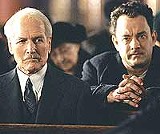[
{
"name": "500x250 Ad",
"insertPoint": "5",
"component": "15667920",
"parentWrapperClass": "",
"requiredCountToDisplay": "1"
}
]
That flashy, fabulous, and complicated entity familiarly known as Hollywood occupies so large and so important an area of the American cultural landscape that it provides a readily recognizable source of satire --- it's easy to make fun of the absurdity and exaggeration of the film industry, and nobody ever misses the joke. In addition, since its earliest days, the cinema has rightly regarded itself as a fascinating subject --- the process, the people, the product always engage the attention of an audience. As a result, movies about the movies practically constitute a genre all their own.
Andrew Niccol, who wrote, directed, and produced Simone, demonstrates a clear comprehension of the complex nature and influence of perhaps the most illusionary of all the arts. He also understands a good deal about the relationship between the cinema and its audience, the art and its critics. His movie most entertainingly extrapolates from the latest developments in computer simulation, digital animation, holography, and virtual reality, to examine the star system, the publicity machine, the cult of celebrity, ultimately, the sheer gullibility of the motion picture audience, and maybe just about everybody else as well.
Al Pacino plays Viktor Taransky, an arty director thwarted by the Hollywood system --- he's just been fired by his ex-wife (Catherine Keener), the head of the studio, because he cannot cope with the tantrums of a spoiled star --- who dreams of making a picture that doesn't depend on the whims of some overpaid, undertalented, egomaniacal performer.
In the manner of a fairy tale, a savior appears, in this case a somewhat demented computer genius who gives Viktor his invention, a stack of computer software that enables him to create a digital image of an actor, which he can integrate into his film. Viktor fine tunes the image, a stunning young woman, Simone --- the name is a contraction of Simulation One --- programs her with a complete set of gestures, provides dialogue, in short directs her to do exactly what he wants, and through a panoply of electronic gadgetry, works her into his movie, Sunrise, Sunset.
Naturally, Sunrise, Sunset turns out to be both a great hit and an artistic success, and the mysterious and reclusive Simone almost immediately becomes a global celebrity. She appears on the covers of magazines all over the world, inspires a cult of worshipers, and, allowing a single interview through the magic of computer simulation, charms television viewers. She stars in another Taransky film and wins the Oscar for Best Actress --- she cannot accept it in person, of course, but graciously thanks the Academy, via satellite transmission from a Third World country, where she is doing humanitarian work.
Because, as the picture shows, people will believe what they want to believe, and as every hoaxer and confidence man knows, people really want to be fooled, Viktor can use Simone to manipulate not only the public, but also the media and even the studio executives. The entertainment reporters and the alleged critics happily accept the nonsense that Viktor improvises to placate their demands for biographical information, personal interviews, opinions, and all the usual baloney that the media, assisted by publicity departments and press releases, serve up daily as news.
Every actor in Hollywood wants to work with her, many claiming that she is a close friend who has personally asked them to star in her movies; all sorts of people, including Viktor's ex-wife claim to have met her; and even the temperamental star who caused Viktor's initial firing tells him that Simone has changed her life and career.
This ideal woman, in the manner of such creations, begins to take over Viktor's life and art; while he previously reiterated that the work, not the personality counts, he finds that in fact Simone overwhelms both his films and his imagination. He must struggle ever harder to invent a plausible context for her, come up with ever new excuses for her absence from any public appearances, and expand her career in new directions to satisfy and distract a clamorous public. He even concocts a negative interview intended to torpedo her career, which backfires and increases her immense popularity, then has her "direct" a horrible movie, I Am Pig, that despite his best efforts, ends up being a smash hit.
Underneath its comic surface and its entirely relevant satire, the movie explores some of the nature of illusion, constantly raising questions about authenticity and fakery, a natural concern for the director of The Truman Show. Viktor Taransky no doubt owes his first name to another creator of an artificial being, a certain Frankenstein, whose state of the art (for the early 19th century) monster, like Simone, ultimately overwhelms him.
In the film versions of Mary Shelley's novel, the creation clearly represents an aspect of its creator, suggesting that whatever Viktor believes, no separation actually exists between the personality and the work; the personality in fact is the work, and Simone may be his grandest achievement.
All art, of course, deals in an illusion we all tacitly, even unconsciously agree to accept, the fiction we all believe --- that a play actually shows "real" people living their lives in front of us, that a novel records someone's voice telling us a true story, that a motion picture (which actually does not even move) represents a peek through some magic window at some remarkable people and events.
With its electronic, chemical, and mechanical process, its extraordinary darkened venue, its hypnotic flickering light, the enormous size of its images, the dazzling beauty of its appearance, film must be the most illusionary art of them all. Ultimately, Viktor learns that the illusion he creates matters more than the reality, that art in fact becomes more real than life, perhaps even that, as Oscar Wilde says, life itself is only bad art.
Simone, starring Al Pacino, Catherine Keener, Evan Rachel Wood, Jay Mohr, Pruitt Taylor Vance, Elias Koteas, Jason Schwartzman, Stanley Anderson, Winona Ryder; written, directed, and produced by Andrew Niccol. Cinemark Tinseltown; Hoyts Greece Ridge; Loews Webster; Regal Culver Ridge; Regal Eastview; Regal Henrietta.
Latest in Movie Reviews
More by George Grella
-

Film Review: "Cake"
Jan 26, 2015 -

Film Review: "American Sniper"
Jan 19, 2015 -

Film Review: "Inherent Vice"
Jan 12, 2015 - More »






